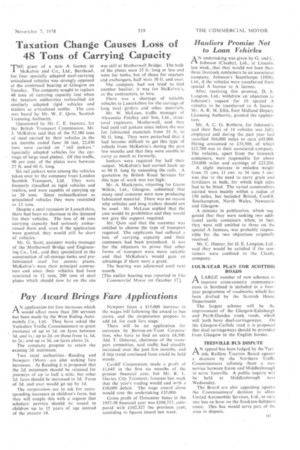Taxation Change Causes Loss of 48 Tons of Carrying Capacity
Page 55

If you've noticed an error in this article please click here to report it so we can fix it.
T"grant of a new A licence to McKelvie and Co., Ltd., Barrhead, for four specially adapted steel-carrying articulated vehicles was strongly opposed at the continued hearing at Glasgow on
Tuesday. The company sought to replace 48 tons of carrying capacity lost when the taxation authorities reclassified six similarly adapted rigid vehicles and trailers as articulated outfits. The case was heard by Mr. W. F. Quin, Scottish Licensing Authority.
Questioned by Mr. C. E. Jauncey, for the British Transport Commission, Mr.
J. McKelvie said that of the 92,380 tons of steel carried by their vehicles in the six months ended June 30 last, 22,030 tons were carried on "rail jankers " (specially adapted vehicles for the carriage of large steel plates). Of this traffic, 90 per cent, of the plates were between 27 ft. and 60 ft. long.
Six rail jankers were among the vehicles taken over by the company from London Scottish Transport, Ltd. They were formerly classified as rigid vehicles and trailers, and were capable of carrying up to 20 tons. Since reclassification as articulated vehicles they were restricted to 12 tons.
Despite a steel recession in Lanarkshire, there had been no decrease in the demand for their vehicles. The loss of 48 tons carrying capacity had seriously embarrassed them and, even if the application were granted, they would still be short of vehicles.
Mr. G. Scott, assistant works manager of the Motherwell Bridge and Engineer ing Co., Ltd., said they specialized in the construction of oil-storage tanks and prefabricated steel for atomic plants.
McKelvie's were their principal contractors and since their vehicles had been restricted to 12 tons, 200 tons of steel plates which should now be on the site was still at Motherwell Bridge. The bulk of the plates were 25 ft. long or less and were for tanks, but of those for reactors and exchangers, half were 30 ft. and over.
The company had not tried to find another haulier; it was for McKelvie's, as the contractors, to hire.
There was a shortage of suitable vehicles in Lanarkshire for the carriage of long steel girders and other materials.
Mr. W. McLean, traffic manager of Alexander Findlay and Son, Ltd., struc tural engineers, Motherwell, said they had used rail jankers since before the war for fabricated materials from 35 ft. to 90 ft. long. They were perturbed that it had become difficult to get this type of vehicle from McKelvie's during the past few months and that they were unable to carry as much as formerly.
Jankers were required for half their output. McKelvie's had carried loads up to 90 ft. long by extending the rails. A quotation by British Road Services for this type of work was too high, Mr. A. Mackenzie, objecting for Gavin Wilkie, Ltd., Glasgow, submitted that many steel concerns were now producing fabricated material. There was no reason why vehicles and long trailers should not
be used. Mr. McLean replied that the cost would be prohibitive and they would. not give the support required.
Mr. Quin said that the customer was entitled to choose the type of transport required. The applicants had suffered a loss of carrying capacity and their customers had been prejudiced. It was for the objectors to prove that other forms of transport were more suitable and that McKelvie's would gain an advantage if there were a grant.
• The hearing was adjourned until next month.
[The earlier hearing was reported in The Commercial Motor on October 17.]












































































































































